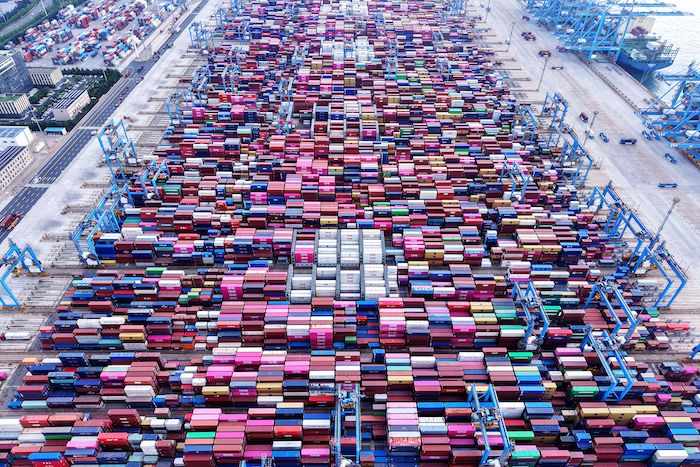Concern is rising in Beijing about the Trump Administration’s tariff deals, both with China and its neighbours in Southeast Asia.
China is particularly worried about aspects of the framework deal the US signed with Vietnam that would impose a 40% tariff on Chinese goods shipped to the US via ports in Hanoi, which could face a 40% tariff from next month.
Beijing threatened on Tuesday to retaliate against nations that strike deals with the United States to cut China out of supply chains. It also warned the US not to escalate trade tensions by restoring tariffs on its goods next month.
ALSO SEE: Japan, South Korea Desperate to Reduce 25% Tariff by August
Washington and Beijing agreed to a trade framework in June that restored a fragile truce, but with many details still unclear, traders and investors on both sides of the Pacific are watching to see if it will unravel or lead to a lasting detente.
On Monday, President Donald Trump began notifying trade partners of sharply higher US tariffs from August 1, after he delayed all but 10% of his April duties on most countries to give them time to strike deals with the world’s largest economy.
China, initially singled out with tariffs exceeding 100%, has until August 12 to reach an agreement with the White House to keep Trump from reinstating additional import curbs imposed during tit-for-tat tariff exchanges in April and May.
Call for dialogue
“One conclusion is abundantly clear: dialogue and cooperation are the only correct path,” the official People’s Daily said in a commentary, referring to the exchanges in the current round of China-US trade tension.
The article was signed “Zhong Sheng”, or “Voice of China”, a term the paper uses to express views on foreign policy.
Reiterating Beijing’s view that Trump’s tariffs amount to “bullying”, the paper added, “Practice has proven that only by firmly upholding principled positions can one truly safeguard one’s legitimate rights and interests.”
The remarks set the stage for another round of tariff war should Trump stick to what the ruling Communist Party’s official daily said was “a so-called ‘final deadline.'”
The average US tariff on Chinese exports now stands at 51.1%, while the average Chinese duty on US goods is 32.6%, with both sides covering all their trade, the Peterson Institute for International Economics said.
Beijing upset at ‘trans-shipment’ levy
The paper also took a swipe at regional economies that are considering striking tariff reduction deals with the United States that cut China out of their supply chains.
Last week, Vietnam secured a tariff reduction to 20% from 46% with a deal for goods “transshipped” through it, typically originating from China, to be subjected to a levy of 40%.
“China firmly opposes any side striking a deal that sacrifices Chinese interests in exchange for tariff concessions,” the paper said.
“If such a situation arises, China will not accept it and will respond resolutely to protect its legitimate interests.”
US restores funding for Tibetans in South Asia
The United States has restored $6.8 million in funding for Tibetans in South Asia, the US State Department said on Tuesday, confirming comments by Tibet’s government-in-exile.
The aid had been cut by President Donald Trump’s administration as part of its “America First” policy that hit a number of programmes, including those aimed at securing food and preventing the spread of HIV in some of the world’s poorest regions.
China’s foreign ministry said on Tuesday that the United States was in “no position” to point fingers at the country on issues related to Tibet and urged Washington to fully recognise the “sensitivity” of such matters.
Ministry spokesperson Mao Ning made the remarks when asked to comment on US Secretary of State Marco Rubio’s statement on the Dalai Lama’s 90th birthday on Sunday (July 6), after a week of celebrations by his followers.
Mao said at a regular news conference that the Dalai Lama “is a political exile who is engaged in anti-China separatist activities under the cloak of religion,” and has “no right” to represent the Tibetan people.
The spiritual leader of Tibetan Buddhists assured followers last week that upon his death, he would be reincarnated, and a non-profit institution he has set up will have the sole authority to identify his reincarnation, countering China’s insistence that it will choose his successor.
China offers trade deal review to Australia

Meanwhile, Australian Prime Minister Anthony Albanese said on Tuesday he would visit China from this weekend as Beijing looks to build on partnerships on AI, green energy and the digital economy.
“I look forward to going to Shanghai, Beijing and Chengdu, which I will visit from Saturday,” Albanese told reporters in Hobart. He did not give more details about his trip.
The Chinese foreign ministry confirmed that Albanese will be visiting the country from July 12 to 18.
“China is willing to work with Australia to take this visit as an opportunity to strengthen communication, enhance mutual trust and expand practical cooperation,” ministry spokesperson Mao Ning told a regular press conference.
This would be Albanese’s second visit to China as prime minister, after his re-election in May.
Albanese’s first visit to Beijing as prime minister in 2023 broke a seven-year freeze in diplomatic ties, and he emphasised the need for communication with China, despite differences between the two trading partners.
Albanese’s trip comes as China, its largest trading partner, suggested a review of the 10-year-old free-trade agreement between the two countries to boost ties in agriculture and mining, and explore growth areas in new technologies.
“We are willing to review the agreement with a more open attitude and higher standard,” Xiao Qian, the Chinese ambassador to Australia, wrote in The Australian Financial Review on Monday.
When asked if Australia would look to expand the free-trade deal with China to include AI, Albanese said: “We will determine our policy”.
- Reuters with additional input and editing by Jim Pollard
ALSO SEE:
China Says BRICS ‘Not Seeking a Clash,’ After Trump Tariff Threat
China Fears Negative Impacts of US Trade Pact With Vietnam
US Lifts Bans on Chip Software, Ethane, As China Truce Holds
China’s Criticism of Price Wars Sheds Light on Xi’s ‘Waning’ Power
Judge Says China’s Huawei Must Face Trial on Iran Dealings
China’s Factory Profits Plunged in May Amid Trade Upheaval
China Passes 1 Terawatt of Solar Power, Government Says
China Did Not Agree to Military Use of Rare Earths, US Says
Trade Truce Done With 55% Tariffs on China Exports, Trump Says
A Deflationary Spiral Looms Over China as Overcapacity Bites
























